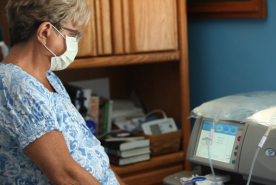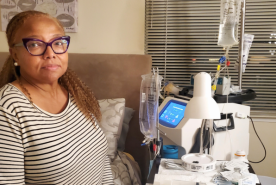What is acid reflux or GERD?
The stomach makes acid to help you digest food and remove bacteria. This is a natural process. In some people, the stomach makes too much acid, which can cause discomfort. When your stomach makes too much acid, you may have symptoms like:
- Burning in your chest
- Regurgitating (bringing up) acid into your throat and mouth
- Sensing a lump in your throat when swallowing
- Burping, bloating, or a feeling of “fullness” in your stomach
- Hiccups
- Coughing
- Chest pains
These symptoms may mean you have acid reflux and heartburn, which can usually be relieved by antacids and no medical treatment. If symptoms become serious and happen more than once a week, it could mean you have gastroesophageal reflux disease (GERD). If that’s the case, your healthcare provider may suggest changes to your diet and lifestyle.
What lifestyle and diet changes can I try?
For many people, simply changing your diet and lifestyle is enough to relieve symptoms. This may include:
- Removing foods from your diet that could trigger symptoms of heartburn and/or acid reflux. To name a few:
- Alcohol
- Caffeine
- Chocolate
- Peppermint
- Spicy Foods, black pepper
- Acidic foods (tomatoes, tomato-based foods, citrus fruit)
- Greasy and high-fat foods (such as pizza, French fries, hamburgers, and deep-fried chicken)
- Not eating 2-3 hours before bedtime
- Finding positions to sleep in that help reduce acid from reaching your throat. Elevating your head and upper body with pillows or a wedge-shaped support pillow can help.
- Quitting smoking
- Losing weight, if needed
If diet and lifestyle changes are not enough, your healthcare provider may put you on a type of medicine called proton pump inhibitors (PPIs).
What are proton pump inhibitors (PPIs)?
PPIs are a type of drug used to ease the symptoms of acid-related conditions. Some of these conditions include serious acid reflux/heartburn, GERD, peptic ulcers (a sore in the lining of the stomach), and Zollinger-Ellison syndrome, a condition in which tumors in the pancreas cause the stomach to make too much acid. PPIs work to lessen the amount of acid made in the lining of the stomach. When PPIs work, the symptoms of severe heartburn, acid reflux, and GERD bother you less. Depending on your diagnosis, your healthcare provider may give you a PPI for only a few weeks, or you may need longer treatment.
What are the types of PPIs?
There are many types of PPIs. Some need a doctor’s prescription. Others can be purchased over-the-counter (OTC, sold in drugstores without a doctor’s prescription). After looking at your diet and lifestyle, and depending on your overall health, your symptoms and how often you have them, your healthcare provider may recommend one of the following:
| Generic Name | Brand Name |
|---|---|
| Dexlansoprazole | Dexilant |
| Esomeprazole | Nexium, Nexium OTC |
| Lansoprazole | Prevacid, Prevacid 24 hour |
| Omeprazole | Prilosec, Prilosec OTC |
| Omeprazole/Sodium Bicarbonate | Zegerid, Zegerid OTC |
| Pantoprazole | Protonix |
| Rabeprazole | AcipHex |
What are the side effects of PPIs?
PPIs are considered safe and effective in most people. But depending on your overall health and how long you have to take your PPI medication, there can be different health concerns and side-effects. It is important to go over these with your healthcare provider to make sure this is the best type of care for your symptoms. As with any medication, you should consider both the benefits and risks. Here are some risks and issues that have occurred in some people:
- Increased chance of chronic kidney disease: It has not been proven that PPI use causes chronic kidney disease, but some studies suggest there is an increased risk of chronic kidney disease in individuals who have normal kidney function before using a PPI. This does not mean that everyone who uses PPIs will get chronic kidney disease, but it is important to know that there may be a risk. Studies did not include individuals who currently have kidney disease, so it is not clear if PPI use can make kidney disease worse.
- Acute interstitial nephritis: This is a condition that causes swelling of the inside of the kidney. This usually happens due to an allergic reaction, typically to medicines you may be taking, like PPIs. Swelling of the inside of your kidney can cause damage, and, if left untreated, can cause serious health problems. Using PPIs may increase the risk of developing acute interstitial nephritis. If caught early, the condition can be treated and leave no signs of damage to your kidneys.
- Increased chance of heart attack(s): Using PPIs for long periods of time (many months to years) may increase the risk of a heart attack. It is not clear why this may happen, but studies suggest that PPI use may increase this risk. Additionally, those who have had a heart attack and are on blood thinners like clopidogrel (Plavix), can have a repeat heart attack. This is because some PPIs can reduce the function of the blood thinner. It is important to talk about any history of heart disease with your healthcare provider before using PPIs.
- Nutritional deficiencies: The use of PPIs may make it hard for your body to absorb or keep certain nutrients needed for good health, like magnesium and iron.
- Iron: Your body needs iron to make red blood cells, but PPI use may decrease your body’s ability to absorb iron. This is especially important for people who have anemia (low number of red blood cells) that is caused by not enough iron, or people with kidney disease, which affects your body’s ability to regulate iron.
- Magnesium: Magnesium is needed to form healthy bones and teeth, and for normal nerve and muscle function. But PPI use can change the way your kidneys remove extra magnesium from your body, causing you to lose too much. Magnesium depletion is more common when you use both a PPI and a diuretic (a medication to remove extra water from your body). If you are taking PPIs and have magnesium depletion, ask your healthcare provider about a different class of medications known as H2 blockers (such as famotidine, ranitidine, or nizatidine)
- Increased chance of bone fracture and bone loss (osteoporosis): It is believed that PPIs can lessen the body’s ability to absorb vitamin B12 or calcium, which can lead to wrist, spine, and hip fractures. This increased risk is especially true if you are on PPIs longer than a year and are age 50 or older. Also, if you are on a type of medication to reduce your chances of hip fracture (bisphosphonate medication), PPI use may interfere with this medication and increase your risk of hip fracture. If you have kidney disease and use PPIs, you should talk to your healthcare provider about the increased risk of bone fracture.
- Increased chance of dementia: In older patients, there is a concern for an increased association of PPI use and dementia (a group of symptoms that affect your memory, thinking, social abilities, and daily function). This is mainly thought to be caused by the fact that PPIs are in the blood that goes to the brain, while also interfering with B12 absorption in the body. These two effects have led some researchers to believe there is an increased association between PPI use and dementia.
- Increased chance of infections(s): Infections can be a concern when using PPIs. Since there is a decreased production of stomach acid, which would help fight against infection, viruses and bacteria can stay in your system and infect other parts of your body. You may be at higher risk for infection if you have asthma, lung disease, decreased immunity (because of HIV/AIDS or diabetes, for example), or are older. Specifically, taking PPIs can increase the risk of the following two types of infections:
- Community-acquired pneumonia: When PPIs work to reduce the acid in your stomach and digestive tract, there may not be enough acid in the digestive tract to help with fighting against bacteria that come into your system through food. The bacteria that stays behind finds other places to ‘live’. These bacteria may then cause a serious infection in your lungs called community-acquired pneumonia. This usually happens within the first few weeks or months of taking PPIs. If you have kidney disease and are on dialysis, it is important to talk to your healthcare team about the increased risk of pneumonia with PPI use.
- Increased chance of infection from Clostridium difficile(C.diff): A less acidic environment that is created by the use of PPIs can cause different types of bacteria to stay in your digestive system. Some of these bacteria can be harmless, and others can increase infections that upset your digestive tract. One bacteria of main concern is C.diff. This bacteria leads to diarrhea, fever, and other symptoms of digestive illness which, if left untreated, can cause other major health concerns.
What if I have kidney disease or kidney failure?
Before taking any antacids or PPIs, you should talk to your healthcare provider. There may be limitations on what you can take and how often you should take it, especially if you are on dialysis. Most importantly, you should not self-treat your symptoms with items bought from a drugstore or pharmacy. Any treatment should always come with the instruction of your healthcare provider.
What else should I know?
For most people, the use of PPIs is generally considered safe and effective. In fact, some experts believe the risks associated with PPIs are very small, while others are more cautious. However, many people can treat heartburn successfully with lifestyles changes alone, so experts encourage trying that first. If your healthcare provider has prescribed an antacid or PPI, be sure to follow the instructions carefully, and do not take them longer than suggested. If you have concerns about PPI use, talk to your healthcare provider.








